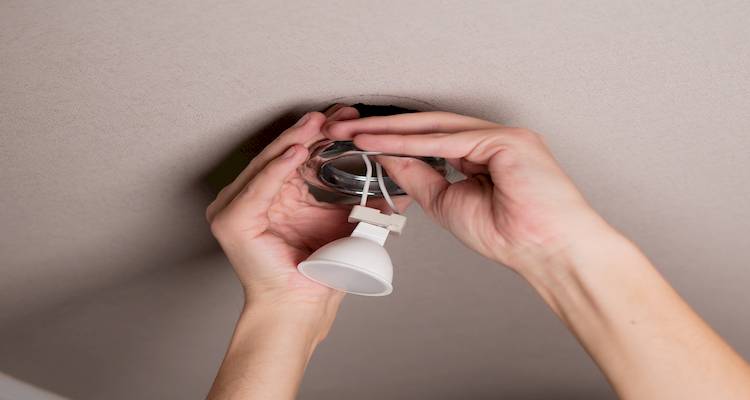EV Charger Installation Cost
- The average electric car charger installation cost is around £1,000.
- This job takes between 2 and 4 hours to finish.
- EV charger installation costs by type and power output.
- The pros and cons of different EV chargers.
- How to find a local EV charger installer using MyJobQuote.
Wondering how much it'll cost to install an electric car charger at home?
This guide will break down the typical EV charger installation cost and what impacts the prices, so you can get a solid idea of what to expect when getting quotes.
Keep in mind that getting quotes early will give you a better idea of what's realistic. You don't need to be ready to start work before having a chat with a local EV charger installer!
Use MyJobQuote to get free quotes from EV charger installers near you. It's quick, easy, and there's no obligation to go ahead.
Keep reading for the full guide below!

£1,000
Table of Contents
- How Much to Install Electric Car Charger?
- What's Included in Car Charger Installation Costs?
- EV Home Charger Cost (Supply Only)
- Labour Cost to Install Electric Car Charger
- OZEV Grants and Government Schemes
- Choosing an Electric Vehicle Charger
- Factors That Impact EV Charger Installation Costs
- What's Involved in Installing an EV Charger?
- Where Can I Install an EV Charging Station?
- Benefits of an EV Charger at Home
- Checklist: Hiring an EV Charging Station Installer
- FAQs
How Much to Install Electric Car Charger?
The average cost to install an electric car charger in the UK is £1,000.
However, you can also potentially reduce your EV charger installation cost if you qualify for an Office for Zero Emission Vehicles (OZEV) grant.

EV Charger Installation Prices
This table shows the main types of home EV chargers, their average prices, and helps you to identify the best match for your EV charging needs:
| Charger Type | Power | Best For? | Average Cost |
|---|---|---|---|
| 3-pin plug | 2.3kW | Useful for occasional/emergency charging, not suitable for long-term use due to slow charging power. | £200 - £300 |
| Untethered home charger | 7kW | Compatible with most electric vehicles and has a good balance between cost and speed. | £450 - £800 |
| Tethered home charger | 7kW | Good for daily charging with built-in cable for ease of use. | £500 - £700 |
| Tesla Wall Connector | 7kW | For use with Tesla vehicles, designed for optimal integration. | £450 - £600 |
What type of electrician do I need to install an EV charger?
What's Included in Car Charger Installation Costs?
Your EV charger installation cost will typically include the following:
- Supply of the EV charging unit
- An on-site survey/inspection to assess requirements and suitability
- Standard cabling/fixings
- Electrical installation of the unit and running the cable
- Testing/certification
- Demonstration and walk-through of setup (usually)

Here's what isn't included in an EV home charger install:
- Additional electrical upgrades/work separate to the EV installation
- Consumer unit upgrades or significant rewiring
- Long cable run installations (longer than the standard allowance)
If, upon inspection, your electrician deems additional electrical work or upgrades necessary, these will be priced separately to your EV fitting costs.
EV Home Charger Cost (Supply Only)
Below is a table of the average supply costs of installing an EV charging point, excluding the costs of labour:
| Charger Type | Power | Average Cost |
|---|---|---|
| 3-pin charging cable | 2.3kW | £200 - £400 |
| Untethered 7kW wall charger | 7kW | £350 - £600 |
| Tethered 7kW wall charger | 7kW | £400 - £700 |
| Tesla Wall Connector | 7kW | £400 - £500 |
Labour Cost to Install Electric Car Charger
The labour cost of an electric vehicle charger installation is typically around £600.
Your EV charger installation costs will fluctuate depending on your cable run length and whether or not you need any additional electrical upgrades or groundwork to complete the fitting.

It will usually take an electrician around 2 to 4 hours to complete an EV charger installation.
EV installation time may vary depending on:
- Size and layout of the property
- Distance from the charging station to the vehicle
- Any other necessary rewiring jobs, electrical upgrades or installations
- Company used and location of your home
What's the cost of fitting a charging station for an electric car at home?
OZEV Grants and Government Schemes
As of 2026, if you live in rented accommodation, or own a flat, you can potentially gain a contribution of up to £350 through the government's OZEV grant (Office for Zero Emission Vehicles) to help towards the cost of having a charger installed.
Eligible Scottish residents can apply for a domestic charge point grant from the Energy Saving Trust, which can provide up to £400 towards fitting and purchase of an EV charger.
Access to the grants and receiving approval is subject to availability and your individual eligibility, which is checked on a case‑by‑case basis.
Once your OZEV grant application has been signed-off and given the go ahead, you'll need an OZEV‑approved installer to fit your charger, making grant‑funded electric vehicle charging stations unsuitable for DIY fitting.
In addition to the above, if you are a landlord you may be eligible for a separate EV infrastructure related grant. Likewise, homeowners without off-street parking that are unable to access a public charger can also contact their local council to enquire about any other potential support that's available in their area.
If you run a business, then workplace and local authority schemes, such as the Workplace Charging Scheme and the On‑Street Residential Chargepoint Scheme (ORCS), can help provide funding to have an electric car charger installed.

Choosing an Electric Vehicle Charger
There are several choices for your home electric vehicle charger, so it's important to understand each type and pick the right option for your car and home.
It's also worth noting that most UK properties have a single-phase electricity supply, meaning chargers up to 7kW are suitable.
Let's look at the most common UK EV chargers and their advantages and disadvantages:
3-Pin Plug
A 3-pin plug is a common choice as it can be used for most standard domestic sockets, with a charging rate of around 2.3kW.
Pros
- ✔ No installation needed
- ✔ Low up-front cost
Cons
- ✖ Slower charging rate
- ✖ Not suitable for long-term use
Untethered Home Charger
Untethered home chargers have a socket but no fixed cable.
Pros
- ✔ Compatible with most electric vehicles
- ✔ Tidy appearance when not in use
Cons
- ✖ Less straightforward than a tethered charging point as you need to attach and detach your own charging cable each time you want to use it
- ✖ You'll need to store your charging cable when not in use
Tethered Home Charger
Tethered home chargers have a built-in charging cable that's permanently attached.
Pros
- ✔ Convenient and useful for everyday use
- ✔ Faster charging capabilities compared to a 3-pin plug
Cons
- ✖ Less visual appeal as the cable is always attached, even when not in use
- ✖ If you change your electric vehicle, you might need to change your charging station if your new car isn't compatible
Tesla Wall Connector
The Tesla Wall Connector is designed for specific Tesla electric vehicle use.
Pros
- ✔ Designed for Tesla vehicles
- ✔ Offers smart feature integration
Cons
- ✖ Can only be used on Tesla vehicles
- ✖ To get the fastest charging speeds, you may need to have three-phase power installed at an extra cost
If I were to purchase a charging station for an electric car, does it have to be stationary and fitted into the mains, or could it be portable?
Factors That Impact EV Charger Installation Costs
The main EV charging station price drivers are due to the type of EV charger, size, power output, ease of access, and geographical location.

- Type of charger: A 3-pin plug will cost less than a tethered charging point, and choosing high-end charging points (branded, such as Tesla) will boost your overall costs.
- Installation location: Ease of access can impact your installation costs. If your charging point is far from your consumer unit, you'll need longer cable runs, equating to higher overall costs.
- Electrical upgrades: If your existing consumer unit needs an upgrade, this will impact your overall costs.
- UK location: EV charger installation costs are higher in the capital and surrounding large cities.

What's Involved in Installing an EV Charger?
Only a qualified electrician should install chargers in the UK for your electric car, as even if you are confident in your DIY skills, it is illegal to do so unless you are officially registered.
As this isn't a suitable project to do yourself, you should only ever have your charger installed by a professional. Search online with MyJobQuote and find tradesmen who are well-experienced in electric car charging and install chargers on a regular basis.
Let's take a broad look at the process when getting an EV charger installed by a qualified electrician:
Before the Job Starts
Site Survey — After deciding on a contractor and your preferred type of electric car charger, they will come and survey the area and measure out the area of installation for the charging point.
Consumer Unit Check — If your consumer unit doesn't have enough capacity for the new installation, your electrician will suggest additional work before the fitting begins. This could include the need to replace a fuse box by installing a new consumer unit.
During the Job
Cable Installation — Your electrician will then run a dedicated cable from your consumer unit to the charging station, adding any necessary insulation if the charging station if you have off street parking outdoors.
Mounting the Charger — The charging station can be attached to the wall, before the charger unit is connected to the power. Providing the after the cable has been secured in the right location.
After the Job
Final Testing — Finally, the electrician will test the EV charging station. This is to ensure your new electric car charger passes safety checks, meets government regulations and is fully operational, without overpowering the main fuse board.

Where Can I Install an EV Charging Station?
Your EV charging station can be installed:
- Inside garages
- On external walls
- Near off-road parking (e.g., driveways)
Other options to place your EVCS include a carport driveway, a covered parking spot, or roadside parking, which is found right outside the property.
For EV installations with grant funding: You may need to have dedicated off-street parking to be approved for specific installation grants.
However, if you don't have off-street parking it may not be possible and if you live in a rented property, landlord approval is required first. Likewise, if you live in a flat with communal grounds, shared parking or with more than one property owner then you may also need permission from freeholders and any management company members.

Benefits of an EV Charger at Home
There are many reasons to purchase an electric car, and the benefits of your own home charging station.
Below are the benefits which come from installing a domestic EV charging station:
Eco-Friendly
One of the most common reasons people choose an electric vehicle is due to the environmentally friendly benefits.
These include zero tailpipe emissions, reducing greenhouse gas emissions, and being a low-carbon choice for the electricity sector.
Convenience
Installing your own charging station at home means you can dedicate specific charging time overnight, and don't have to rely on finding an empty public charging station.
You may also be able to travel longer distances as you can fully charge your vehicle before a journey, and top up your charge at stations along the way.
Cost-Effective
By installing your own EV charging station at home, you'll save on the overall costs of running a vehicle.
Public charging stations charge a premium rate in comparison, costing around 40p to 85p per kWh. By comparison, home charging costs far less.
For example: A full charge from a public charge point will be around £25 to £45, while the same at home will be closer to £8 to £12.
Checklist: Hiring an EV Charging Station Installer
Consider these key points before hiring an electrician and having your EV charger installed:
- Have you received multiple quotes? Find local electricians that specialise in having an electric car charger installed, which you can do so via MyJobQuote and ask for written quotes from at least three separate tradesmen.
- Are they fully qualified and authorised to install an EV charging station? Double-check that the electrician is Part P qualified and authorised to carry out the installation of an electric car charging station.
- Are they part of a recognised government-approved scheme? Make sure they are registered with a government-approved scheme or body as recommended by BRAC (the Building Regulations Advisory Committee).
- Are they an OZEV-approved installation company? If you choose to apply for an OZEV grant, you'll need to find an OZEV-approved installation company which will convert to actual savings once you receive the go-ahead on your grant application.
- Have they completed similar jobs before? Ask how often they install chargers designed for an electric car and make sure that the electrician is familiar with the specific type of electric car charger you need.
- Do they have positive reviews of their work? Check online reviews and testimonials, read through their MyJobQuote profile for additional feedback and search for examples of previous jobs to ensure you're booking a professional installation.
- Have you checked there aren't any hidden charges? Your EV charger cost should automatically include the physical charger unit listed within the quote, but also ask if there are any additional fees such as any internal rewiring or if the main fuse box needs updating.
- Are they insured and do they offer guarantees? Ask to see if your electrician is insured with at least Public Liability Insurance which covers against personal injury or accidental damage. Check they also provide a guarantee for your new electric car charger.
- Have you received a written agreement before starting the work? As part of your initial agreement when having a charger installed for your electric vehicle, make sure everything is confirmed in writing - whether it's a standard installation or one that's likely to be more complicated.
- Will you receive a receipt or payment confirmation? Remember to ask for a receipt or payment confirmation to protect you against possible future disputes.









